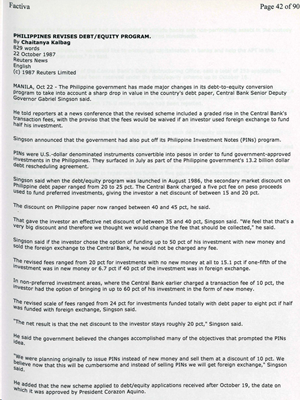PHILIPPINES REVISES DEBT/EQUITY PROGRAM
[Reuters]
Published date: 22nd Oct 1987
22 October 1987
Reuters News
English
(c) 1987 Reuters Limited
MANILA, Oct 22 – The Philippine government has made major changes in its debt-to-equity conversion program to take into account a sharp drop in value in the country’s debt paper, Central Bank Senior Deputy Governor Gabriel Singson said.
He told reporters at a news conference that the revised scheme included a graded rise in the Central Bank’s transaction fees, with the proviso that the fees would be waived if an investor used foreign exchange to fund half his investment.
Singson announced that the government had also put off its Philippine Investment Notes (PINs) program.
PINs were U.S .- dollar denominated instruments convertible into pesos in order to fund government-approved investments in the Philippines. They surfaced in July as part of the Philippine government’s 13.2 billion dollar debt rescheduling agreement.
Singson said when the debt/equity program was launched in August 1986, the secondary market discount on Philippine debt paper ranged from 20 to 25 pct. The Central Bank charged a five pct fee on peso proceeds used to fund preferred investments, giving the investor a net discount of between 15 and 20 pct.
The discount on Philippine paper now ranged between 40 and 45 pct, he said.
That gave the investor an effective net discount of between 35 and 40 pct, Singson said. “We feel that that’s a very big discount and therefore we thought we would change the fee that should be collected,” he said.
Singson said if the investor chose the option of funding up to 50 pct of his investment with new money and sold the foreign exchange to the Central Bank, he would not be charged any fee.
The revised fees ranged from 20 pct for investments with no new money at all to 15.1 pct if one-fifth of the Investment was in new money or 6.7 pct if 40 pct of the investment was in foreign exchange.
In non-preferred investment areas, where the Central Bank earlier charged a transaction fee of 10 pct, the Investor had the option of bringing in up to 60 pct of his investment in the form of new money.
The revised scale of fees ranged from 24 pct for investments funded totally with debt paper to eight pct if half was funded with foreign exchange, Singson said.
“The net result is that the net discount to the investor stays roughly 20 pct,” Singson said.
He said the government believed the changes accomplished many of the objectives that prompted the PINs idea.
“We were planning originally to issue PINs instead of new money and sell them at a discount of 10 pct. We believe now that this will be cumbersome and instead of selling PINs we will get foreign exchange,” Singson said,
He added that the new scheme applied to debt/equity applications received after October 19, the date on which it was approved by President Corazon Aquino.
Translated, assuming an investor buys debt paper at a 40 pct discount and assuming an exchange rate of 20.60 pesos to the dollar, he will in effect be getting 25.75 pesos for every dollar he puts in,” Singson said.
Singson said the debt/equity scheme was subject to further revisions if market conditions changed.
“These are not permanent rates,” he said. “We realise that discounts on the secondary markets keep fluctuating and if there is a significant change we will make necessary adjustments.”
Singson said the Monetary Board had also decided to include banks and non-performing assets in the custody of the Asset Privatisation Trust (APT) in the list of preferred investments.
“The reasons are obvious — we would like to encourage capitalisation in banks and help the APT in the disposition of its bad assets,” he said.
Amando Suratos, Director of the Central Bank’s Debt Restructuring Office, said a total of 253 applications worth 1.17 billion dollars had been received under the debt/equity scheme up to October 16.
He said 101 applications worth 271.6 million dollars had been approved. Of these, 72 applications worth 172.4 million dollars were “closed” or consummated. Suratos said 137 applications worth 702.6 million dollars were pending and 10 applications worth 178.9 million dollars had been rejected.
Singson was asked if pesos the Central Bank released to redeem its debt paper could fuel inflation.
The deputy governor said the Monetary Board had to approve each debt/equity conversion.
“We are controlling it,” he said. “We have targets with the International Monetary Fund on reserve money and we are keeping within that target. We have our ceilings and we are not exceeding them.”
He noted that under the debt/equity scheme, an Investor could not repatriate his investment for at least three years, after which he was allowed to repatriate his funds in five equal annual instalments. “If he came in directly he could repatriate his investment immediately,” he said.






